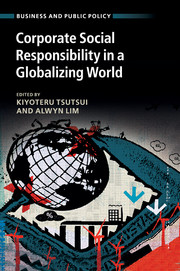14 results
Part III - Corporations’ reaction to global corporate social responsibility pressures
-
- Book:
- Corporate Social Responsibility in a Globalizing World
- Published online:
- 05 May 2015
- Print publication:
- 16 April 2015, pp 249-362
-
- Chapter
- Export citation
Part II - Social construction and field formation in global corporate social responsibility
-
- Book:
- Corporate Social Responsibility in a Globalizing World
- Published online:
- 05 May 2015
- Print publication:
- 16 April 2015, pp 147-248
-
- Chapter
- Export citation
Figures
-
- Book:
- Corporate Social Responsibility in a Globalizing World
- Published online:
- 05 May 2015
- Print publication:
- 16 April 2015, pp xii-xiii
-
- Chapter
- Export citation
Notes on contributors
-
- Book:
- Corporate Social Responsibility in a Globalizing World
- Published online:
- 05 May 2015
- Print publication:
- 16 April 2015, pp xvi-xxii
-
- Chapter
- Export citation
Tables
-
- Book:
- Corporate Social Responsibility in a Globalizing World
- Published online:
- 05 May 2015
- Print publication:
- 16 April 2015, pp xiv-xv
-
- Chapter
- Export citation
Index
-
- Book:
- Corporate Social Responsibility in a Globalizing World
- Published online:
- 05 May 2015
- Print publication:
- 16 April 2015, pp 473-487
-
- Chapter
- Export citation
Copyright page
-
- Book:
- Corporate Social Responsibility in a Globalizing World
- Published online:
- 05 May 2015
- Print publication:
- 16 April 2015, pp vi-vi
-
- Chapter
- Export citation
Contents
-
- Book:
- Corporate Social Responsibility in a Globalizing World
- Published online:
- 05 May 2015
- Print publication:
- 16 April 2015, pp ix-xi
-
- Chapter
- Export citation

Corporate Social Responsibility in a Globalizing World
-
- Published online:
- 05 May 2015
- Print publication:
- 16 April 2015
Part IV - The impact of global corporate social responsibility pressures on corporate social responsibility outcomes
-
- Book:
- Corporate Social Responsibility in a Globalizing World
- Published online:
- 05 May 2015
- Print publication:
- 16 April 2015, pp 363-472
-
- Chapter
- Export citation
Dedication
-
- Book:
- Corporate Social Responsibility in a Globalizing World
- Published online:
- 05 May 2015
- Print publication:
- 16 April 2015, pp vii-viii
-
- Chapter
- Export citation
1 - The social regulation of the economy in the global context
-
-
- Book:
- Corporate Social Responsibility in a Globalizing World
- Published online:
- 05 May 2015
- Print publication:
- 16 April 2015, pp 1-24
-
- Chapter
- Export citation
Part I - Legitimation and contestation in global corporate responsibility
-
- Book:
- Corporate Social Responsibility in a Globalizing World
- Published online:
- 05 May 2015
- Print publication:
- 16 April 2015, pp 25-146
-
- Chapter
- Export citation
Acknowledgements
-
- Book:
- Corporate Social Responsibility in a Globalizing World
- Published online:
- 05 May 2015
- Print publication:
- 16 April 2015, pp xxiii-xxiv
-
- Chapter
- Export citation

